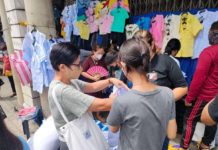
MANILA – Remittances from overseas Filipinos are expected to hit more than $31 billion this year, Representative Henry Ong said, citing figures from the Bangko Sentral ng Pilipinas.
“Considering that monthly OFW money transfers have not gone lower than $2 billion since February 2016 … personal remittances already totaled $26.5 billion in January to October, the $31 billion mark is near certainty,” said Ong, who chairs the House committee on banks and financial intermediaries.
“Since the remittances always peak in December, there is even a high probability the $31 billion would be surpassed,” he added.
Central bank figures showed remittances from overseas Filipinos in Africa rose by 22.7 percent to $113.23 million in January to October this year, from $92.3 million in the same period last year.
Remittances from Africa largely came from Liberia, amounting to $57,85 million. Money transfers from Nigeria, Seychelles, and Egypt were also modestly strong, at $8.74 million, $2.01 million, and $2.06 million, respectively, Ong noted.
Remittances from Europe grew by 8.7 percent to $3.44 billion from $3.16 billion, primarily from Filipino seafarers whose ships were registered in the Netherlands, Norway, Germany, and Cyprus.
A significant portion of the amount, however, also came from land-based workers, such as nurses and engineers, farmhands, and household service workers.
Remittances from the Pacific island nations were also strong, increasing by 11.5 percent to $647 million from $580.4 million. Money transfers from New Zealand and the Marshall Islands reached $199.11 million and $42.80 million, respectively.
From Northern America, more than $10 billion were remitted to the Philippines. Money transfers from the United States rose by 6 percent to $8.2 billion, and from Canada up 54.1 percent at $806.36 million.
Ong is proposing for the government to invest in maritime education, noting that most remittances were from seafarers.
Only two maritime schools are funded by the government, namely the Philippine Merchant Marine Academy (PMMA) in Zambales and the National Maritime Polytechnic (NMP) in Tacloban, Leyte.
“To further strengthen our position as a major maritime nation, I believe we should invest more in maritime education through the PMMA which should become a university and the NMP, converted into a state college,” Ong said.
He is recommending that economic managers try to convince overseas Filipinos to invest their earnings in small business ventures, interest income-bearing securities, retirement savings, health care insurance, and quality education for the benefit of their dependents.
“I also want to see the Overseas Filipino Bank, a subsidiary of the Land Bank of the Philippines, to have a much deeper and growing role in the investment decisions of OFWs and their dependents,” he said.
“As to the deployment policy, the Philippines should forge overseas Filipino workers’ bridges with the … economies of Africa, South America, and Eastern Europe,” Ong added. (GMA News)



